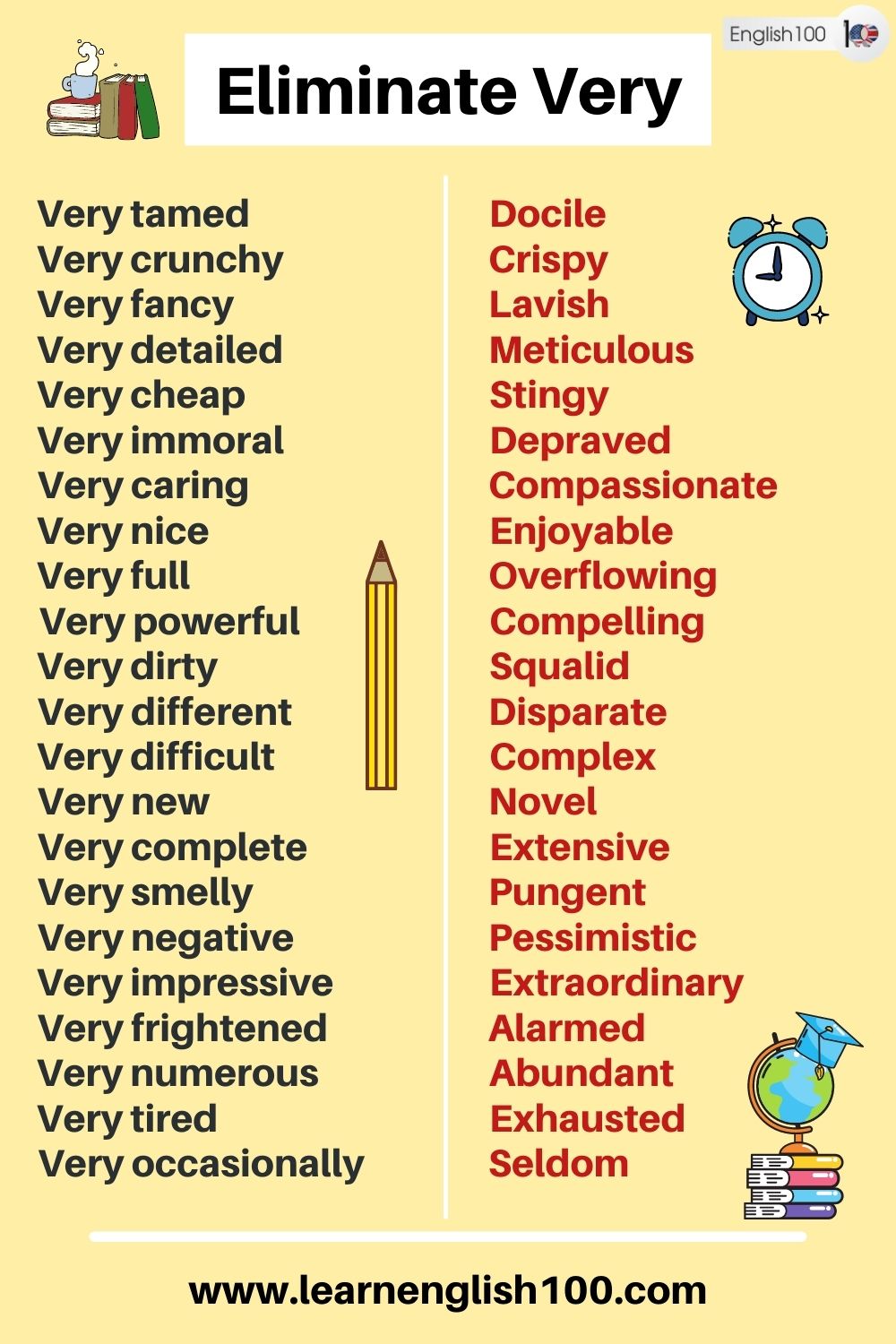
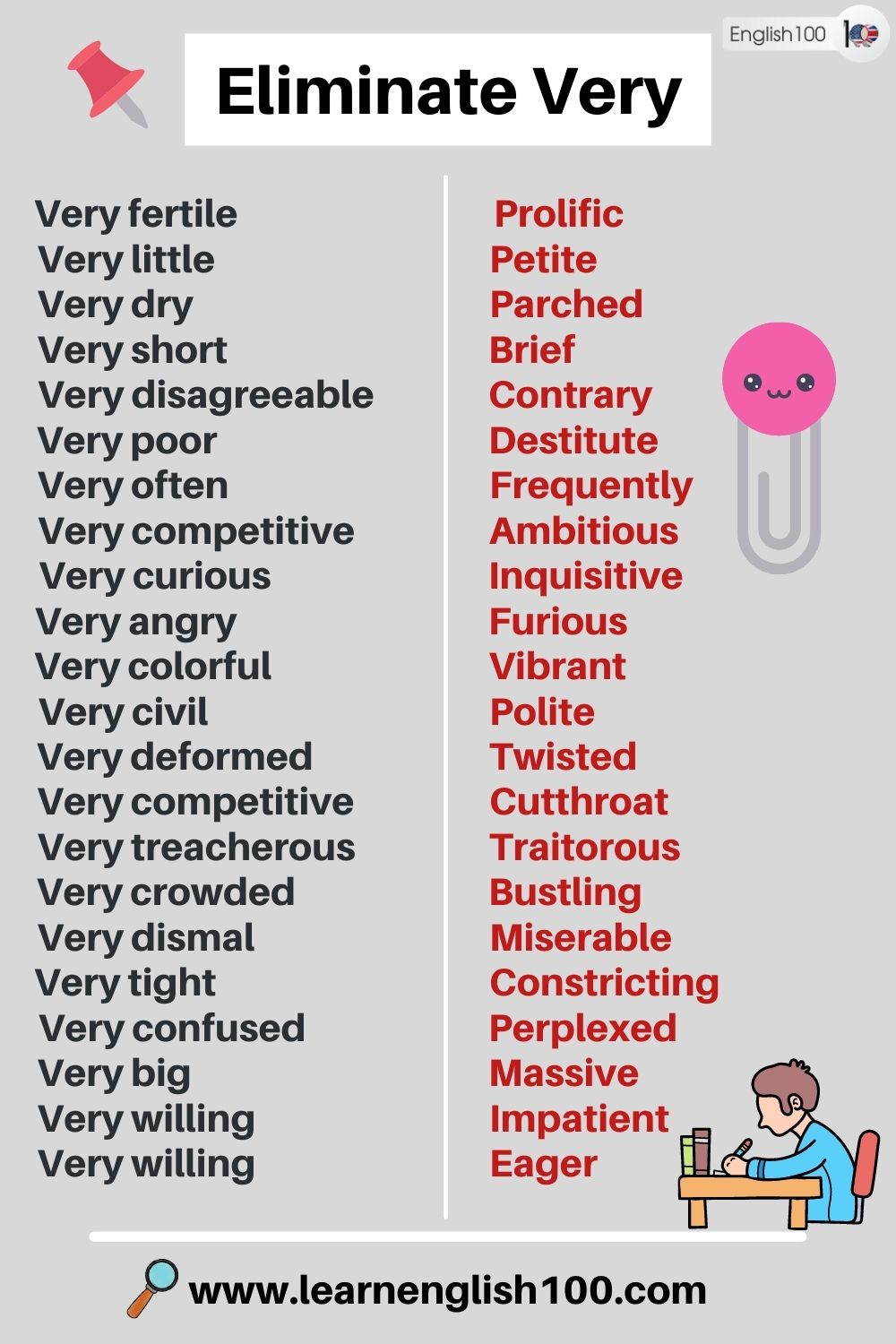
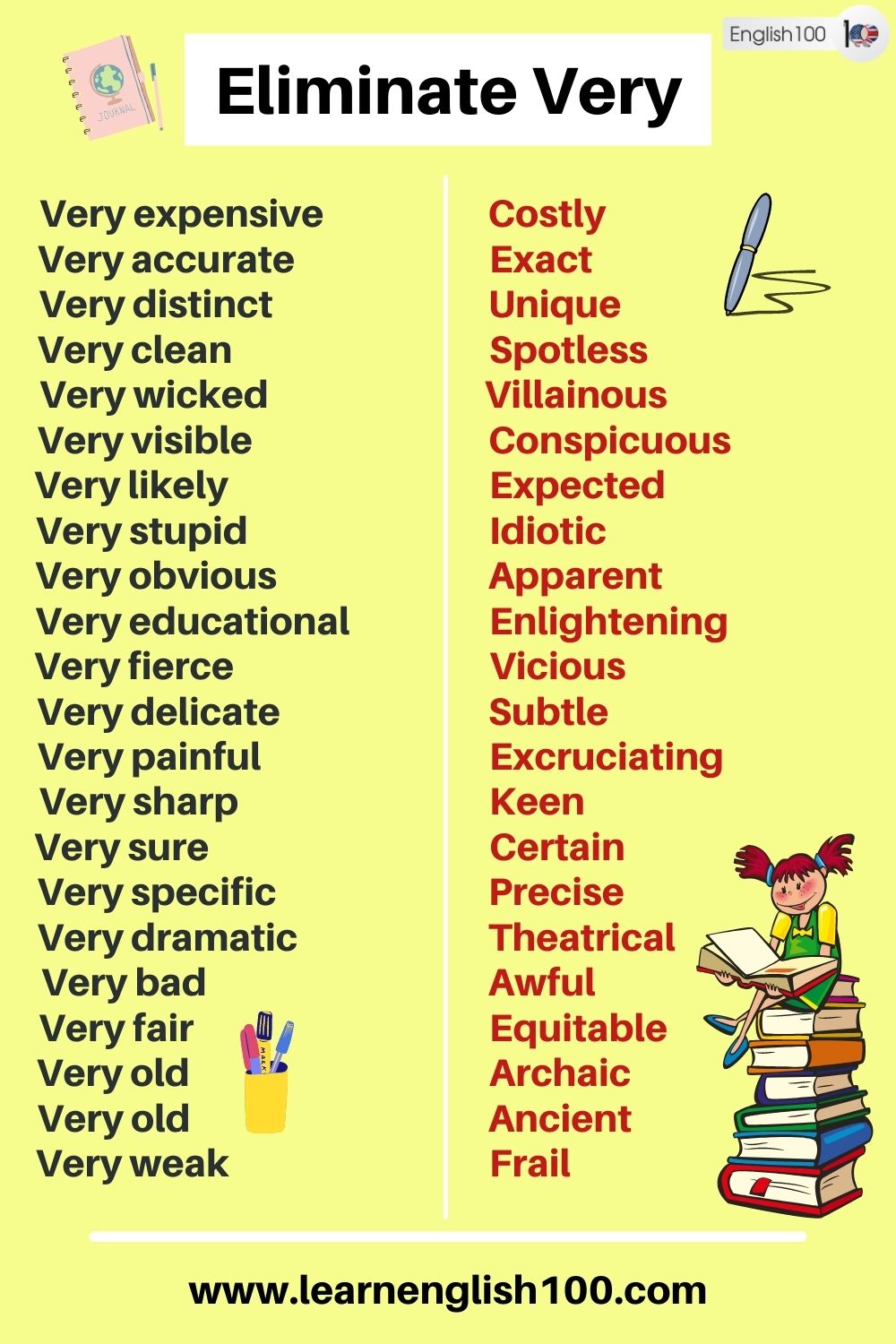
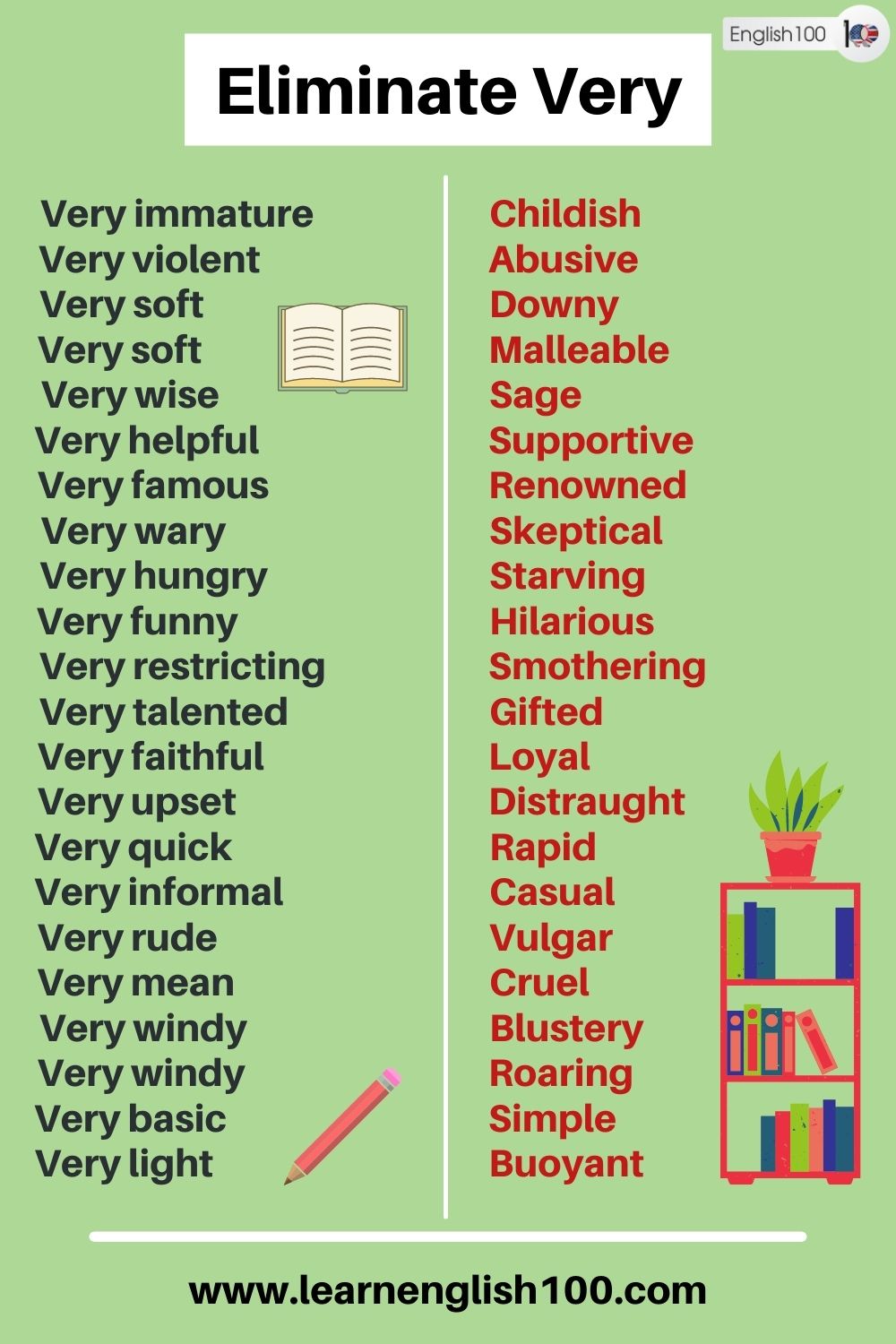
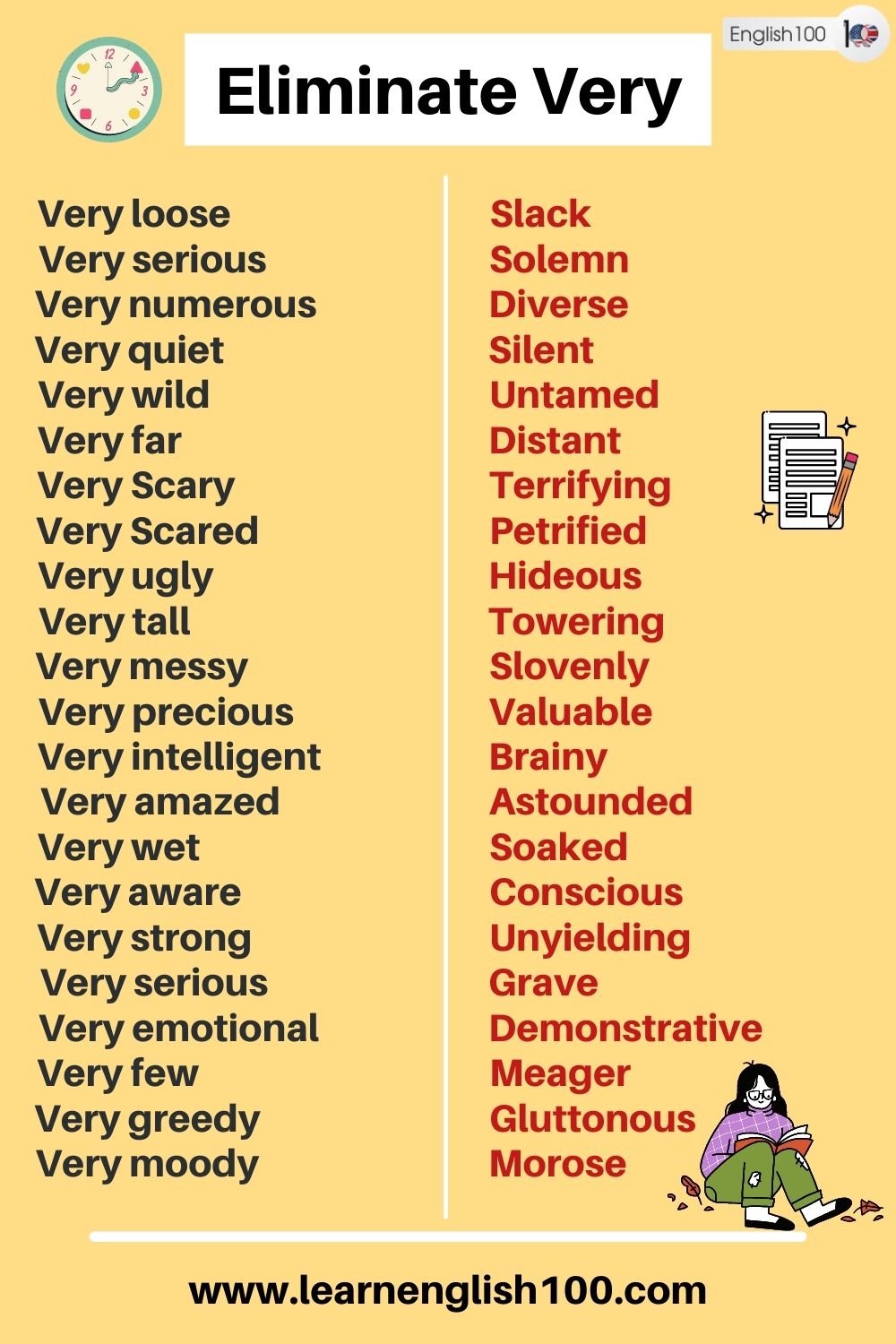
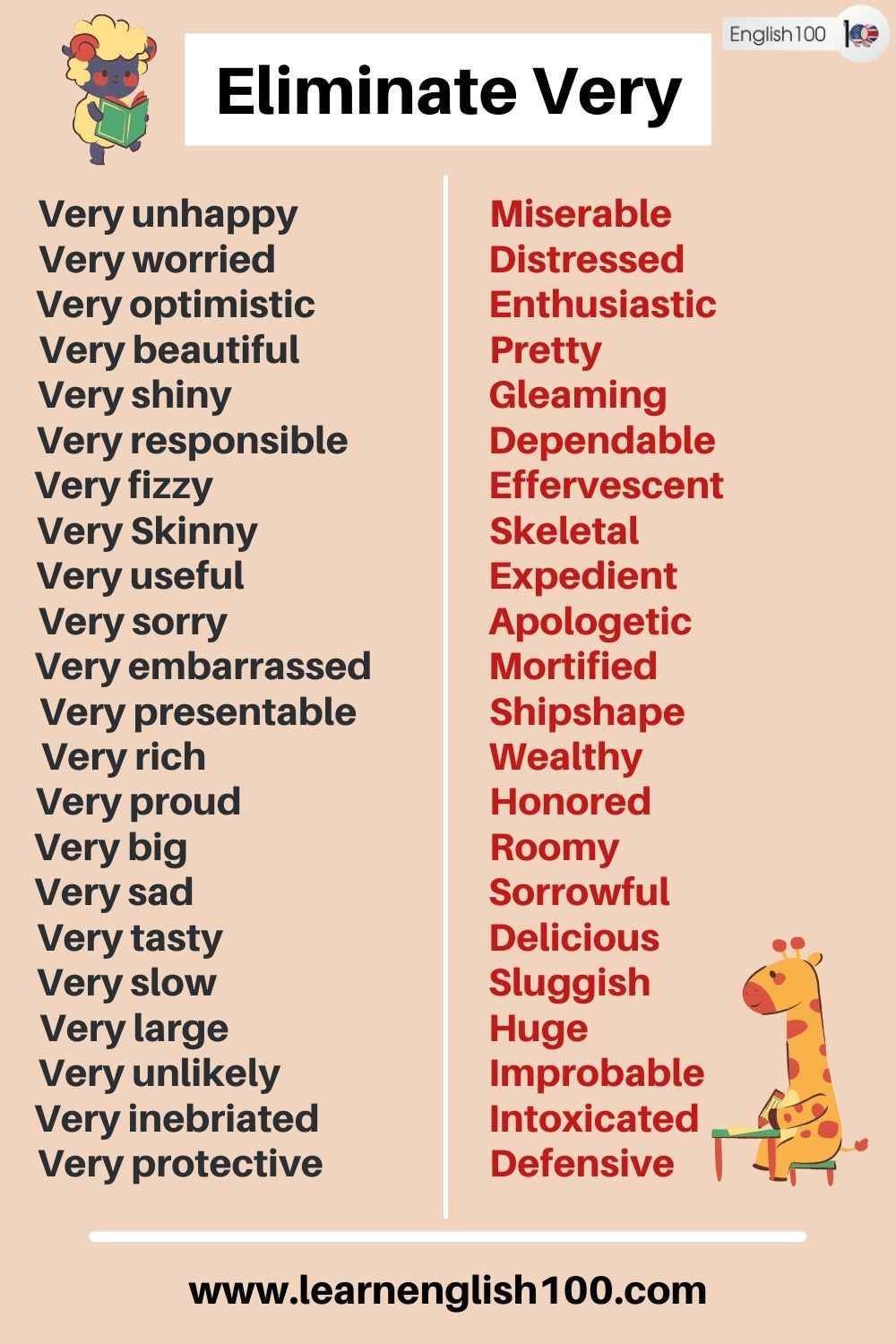
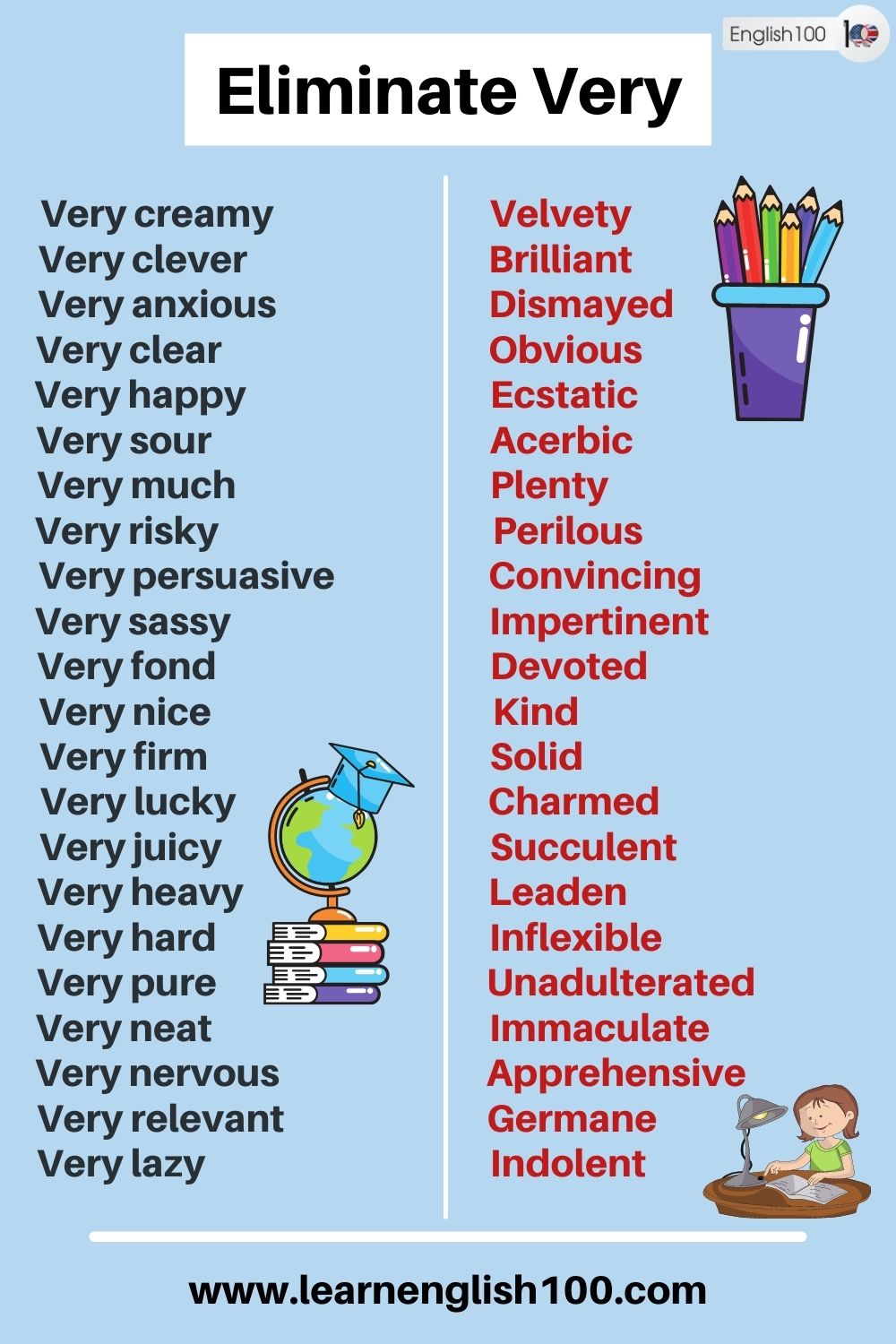
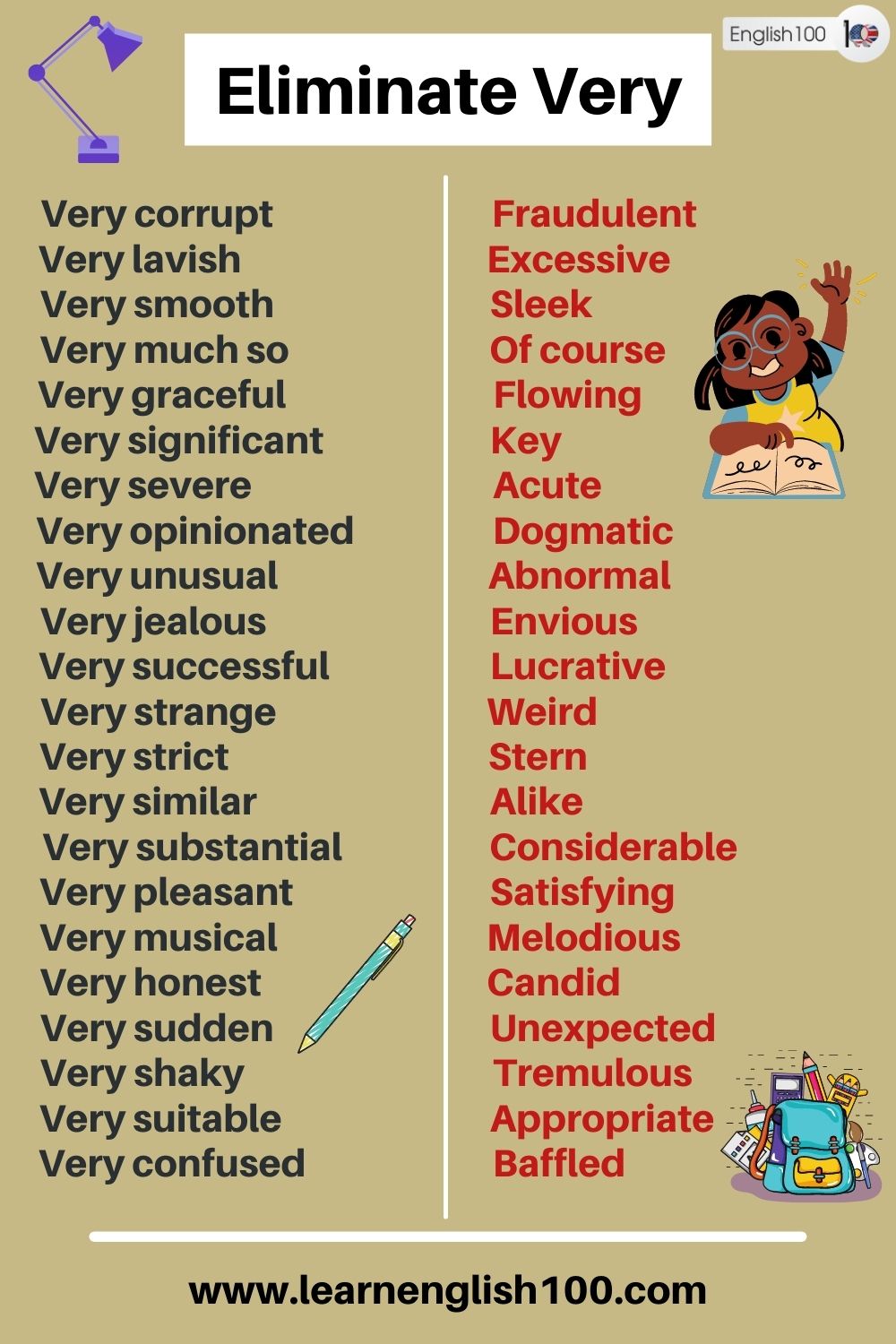
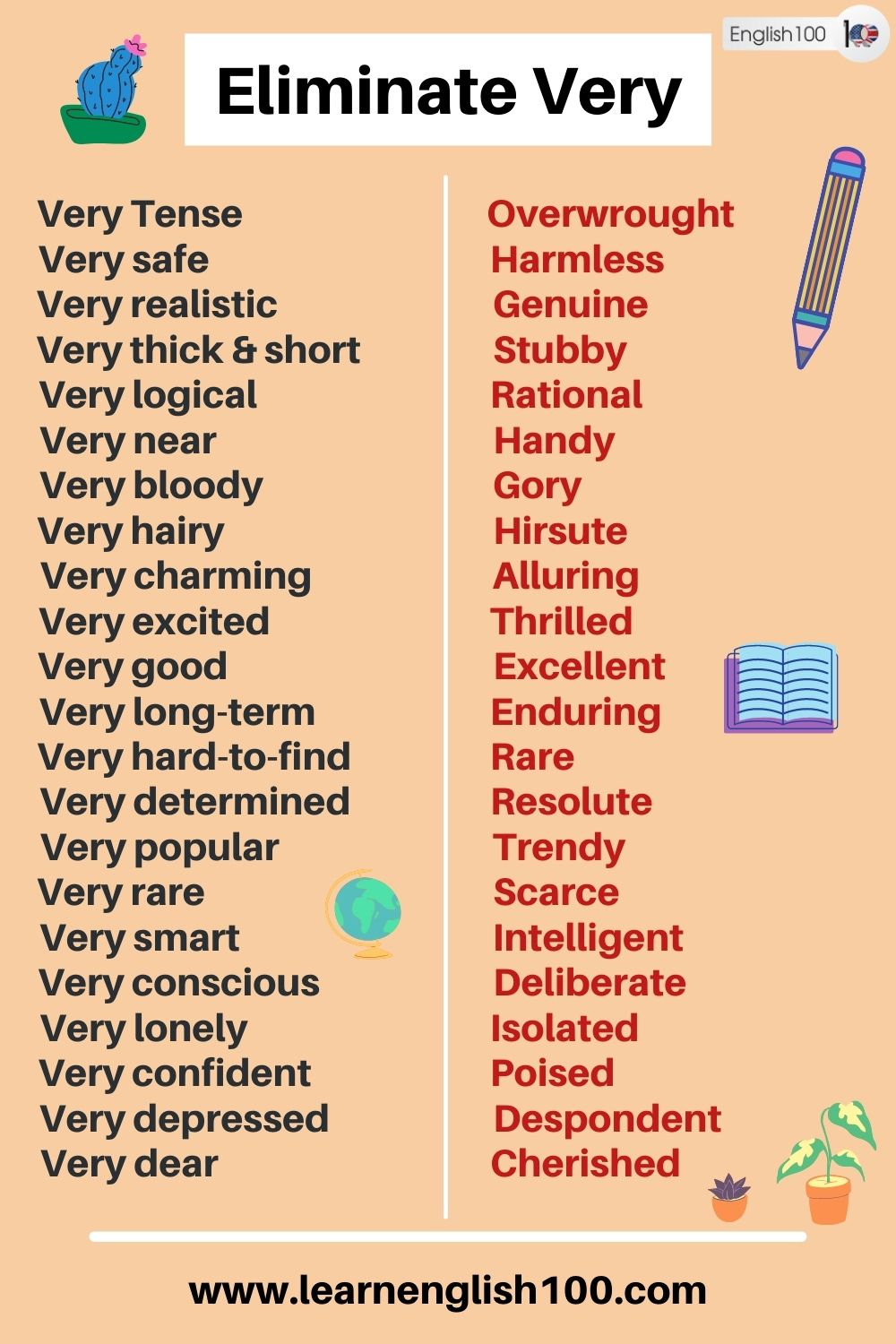
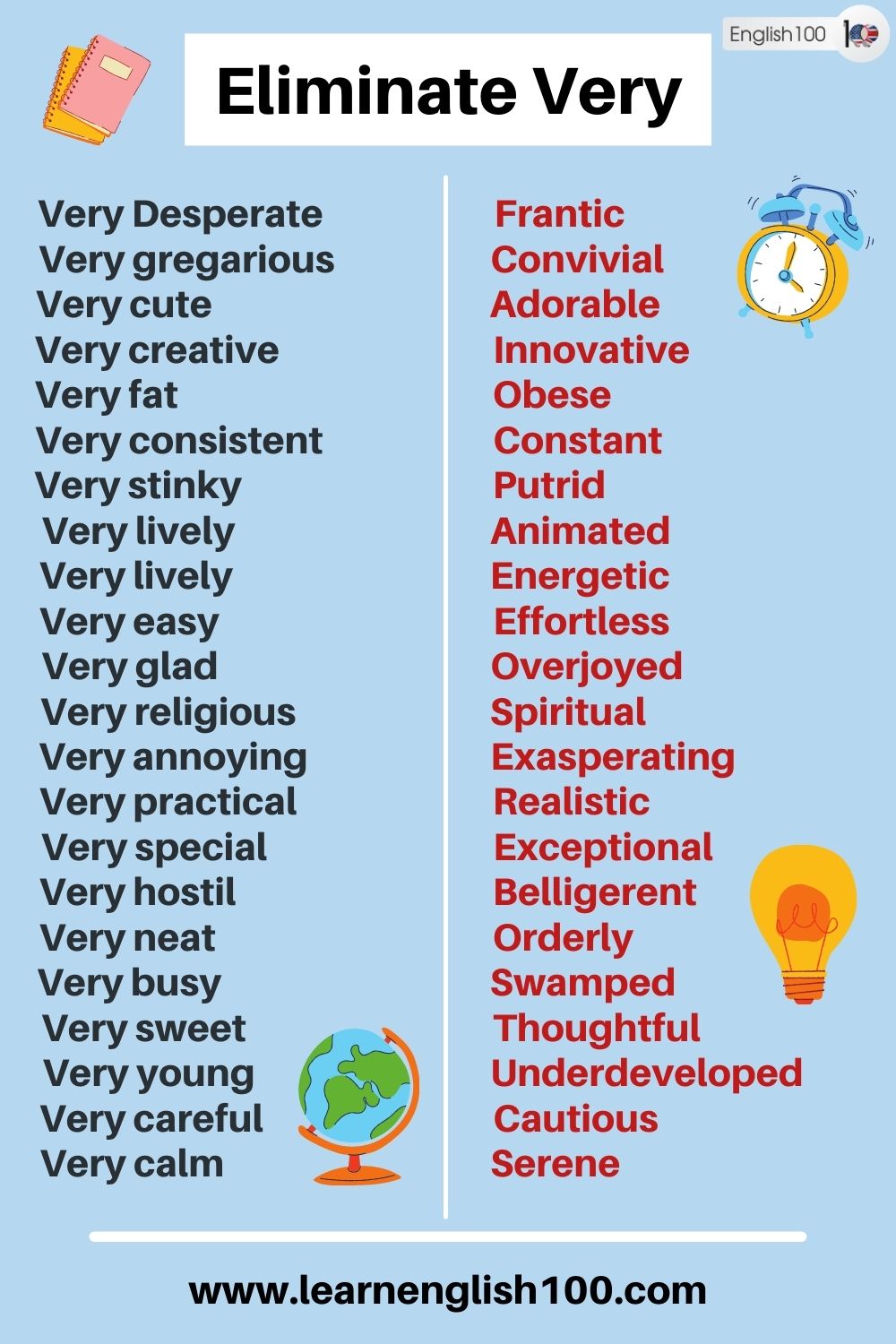
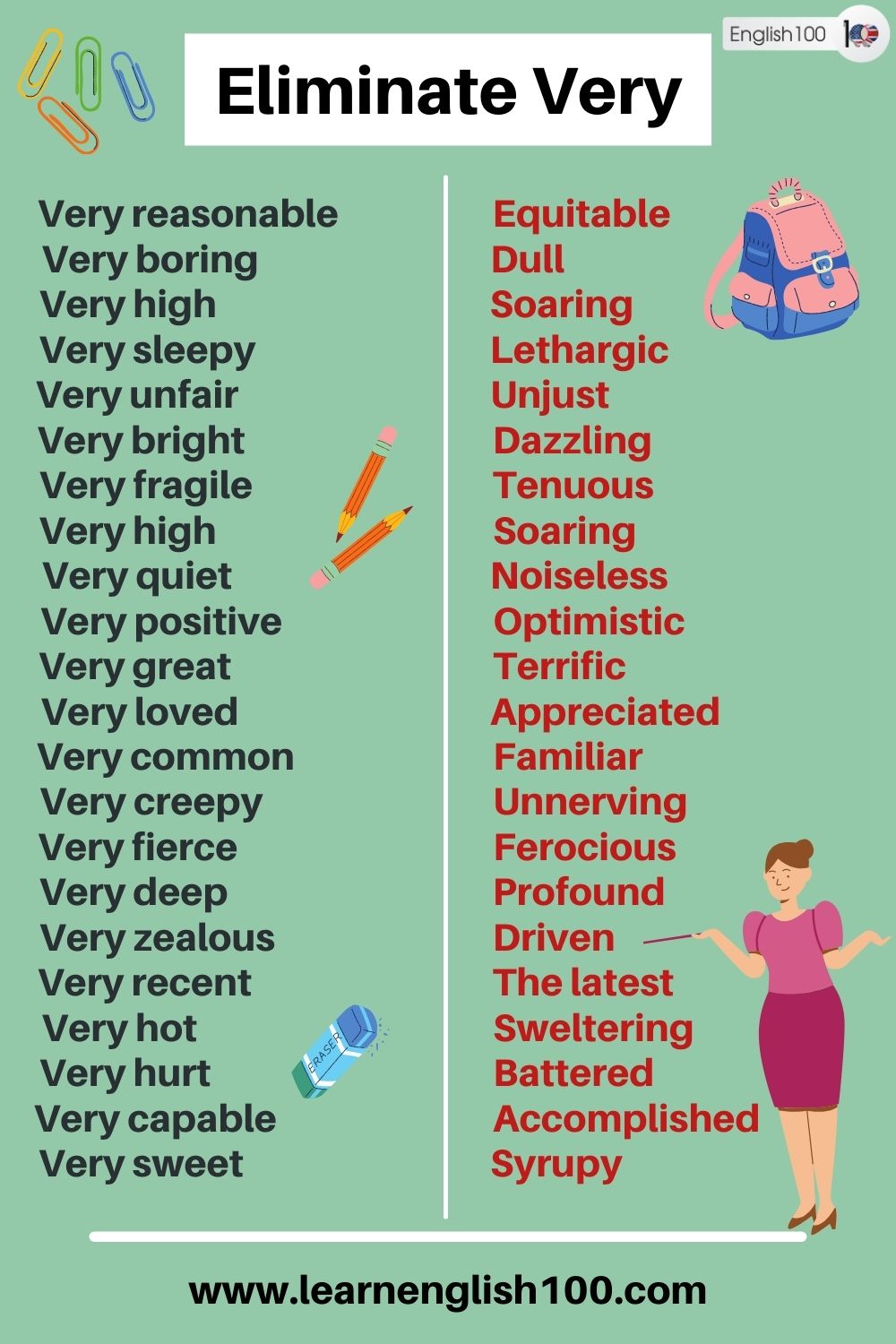
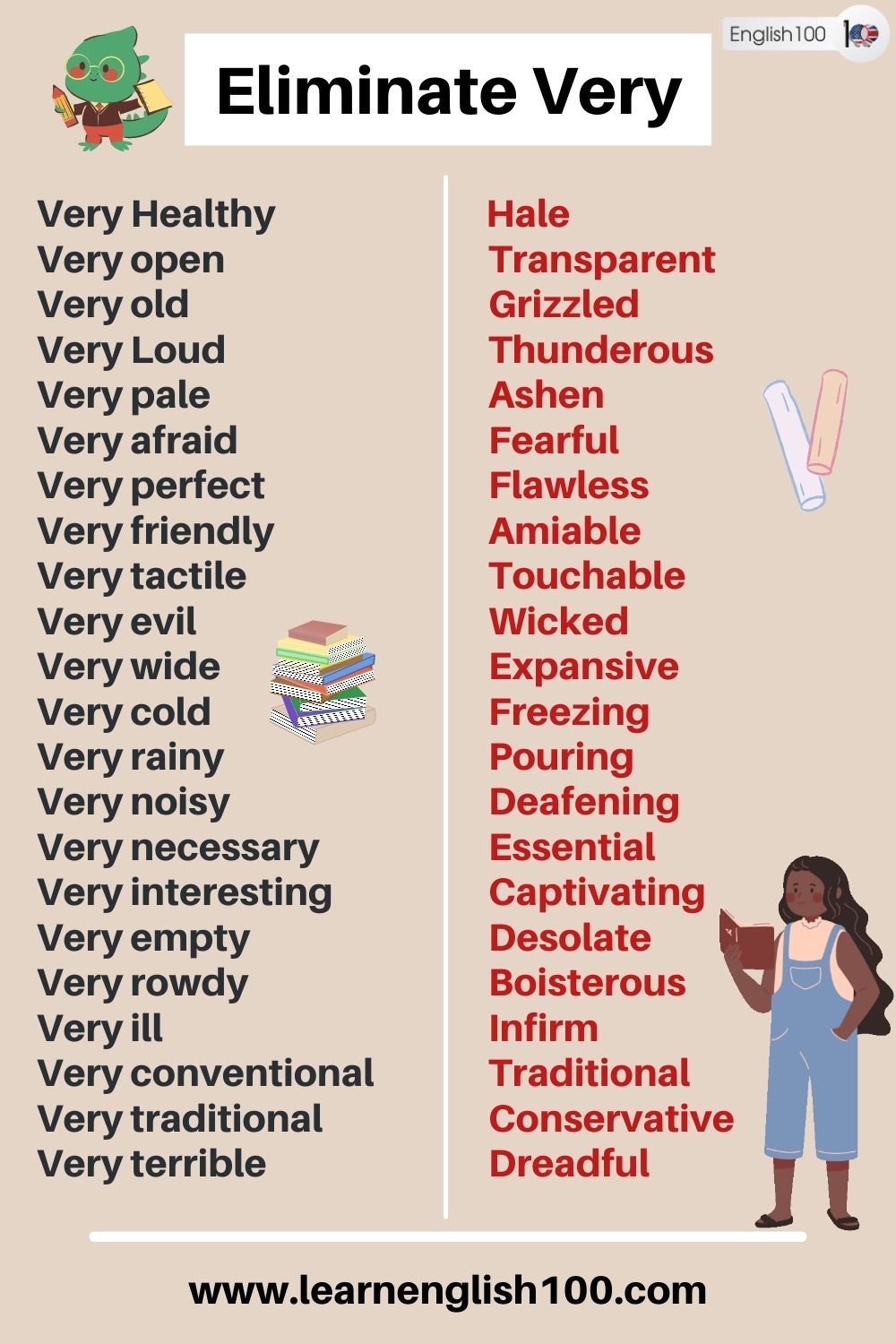
Eliminate Very
Vocabulary enrichment is a very necessary skill for natives and foreign learners alike. Here’s a list of words that can reiterate and emphasize the meaning required from very:
Very Healthy = Hale
Very open = Transparent
Very old = Grizzled
Very Loud = Thunderous
Very pale = Ashen
Very afraid = Fearful
Very perfect = Flawless
Very friendly = Amiable
Very tactile = Touchable
Very evil = Wicked
Very wide = Expansive
Very cold = Freezing = Frigid
Very rainy = Pouring
Very noisy = Deafening
Very necessary = Vital = Essential = Crucial = Critical
Very interesting = Captivating = Breath-taking
Very empty = Desolate
Very rowdy = Boisterous
Very ill = Infirm
Very conventional = Traditional
Very traditional = Conservative
Very terrible = Dreadful
Very tamed = Docile
Very crunchy = Crispy
Very fancy = Lavish
Very detailed = Meticulous
Very cheap = Stingy
Very immoral = Depraved
Very caring = Compassionate
Very nice = Enjoyable
Very full = Overflowing
Very powerful = Compelling
Very dirty = Squalid = Filthy
Very different = Disparate
Very difficult = Arduous = Complicated = Complex = Sophisticated
Very new = Novel
Very complete = Comprehensive = Extensive
Very smelly = Pungent
Very negative = Pessimistic
Very impressive = Extraordinary
Very frightened = Alarmed
Very numerous = Abundant
Very tired = Exhausted
Very occasionally = Seldom
Very fertile = Prolific
Very little = Tiny = Small = Petite = Minuscule
Very dry = Parched = Arid
Very short = Brief
Very disagreeable = Contrary
Very poor = Destitute = Underprivileged
Very often = Frequently
Very competitive = Ambitious
Very curious = Inquisitive
Very angry = Furious
Very colorful = Vibrant
Very civil = Polite = Civilized
Very deformed = Twisted
Very competitive = Cutthroat
Very treacherous = Traitorous
Very crowded = Bustling
Very dismal = Miserable
Very tight = Constricting
Very confused = Perplexed
Very big = Massive
Very willing = Impatient
Very willing = Eager
Very expensive = Costly
Very accurate = Exact
Very distinct = Unique
Very clean = Spotless = Pristine
Very wicked = Villainous = Evil
Very visible = Conspicuous
Very likely = Expected
Very stupid = Idiotic
Very obvious = Apparent
Very educational = Enlightening = Illuminating
Very fierce = Vicious
Very delicate = Subtle
Very painful = Excruciating
Very sharp = Keen (Mentally & Physically)
Very sure = Certain = Positive
Very specific = Precise
Very dramatic = Theatrical
Very bad = Awful = Atrocious
Very fair = Equitable
Very old-fashioned = Archaic
Very old = Ancient
Very weak = Frail = Fragile = Feeble
Very immature = Childish
Very violent = Abusive
Very soft = Downy
Very soft = Malleable
Very wise = Sage
Very helpful = Supportive
Very famous = Renowned
Very wary = Skeptical = Suspicious = Dubious
Very hungry = Starving = Ravenous
Very funny = Hilarious
Very restricting = Smothering = Stifling
Very talented = Gifted
Very faithful = Loyal
Very upset = Distraught
Very quick = Rapid = Swift
Very informal = Casual
Very rude = Vulgar
Very mean = Cruel
Very windy = Blustery
Very windy = Roaring
Very basic = Simple = Rudimentary
Very light = Buoyant
Very loose = Slack
Very serious = Solemn
Very numerous = Diverse
Very quiet = Silent = Hushed
Very wild = Untamed
Very far = Distant
Very Scary = Terrifying = Chilling = Daunting
Very Scared = Petrified
Very ugly = Hideous
Very tall = Towering
Very messy = Slovenly
Very precious = Valuable = Priceless
Very intelligent = Brainy
Very amazed = Astounded
Very wet = Soaked = Saturated
Very aware = Conscious
Very strong = Unyielding = Forceful = Muscular = Aggressive
Very serious = Grave
Very emotional = Demonstrative
Very few = Meager
Very greedy = Gluttonous
Very moody = Morose = Glum = Sullen = Sour = Gloomy
Very unhappy = Miserable
Very worried = Distressed = Concerned
Very optimistic = Enthusiastic
Very beautiful = Pretty = Handsome = Gorgeous = Marvelous = Exquisite
Very shiny = Gleaming
Very responsible = Dependable
Very fizzy = Effervescent
Very Skinny = Skeletal = Gaunt = Bony
Very useful = Expedient
Very sorry = Apologetic = Remorseful
Very embarrassed = Mortified
Very presentable = Shipshape
Very rich = Wealthy
Very proud = Honored = Revered
Very big = Roomy = Spacious = Vast
Very sad = Sorrowful
Very tasty = Delicious = Delectable
Very slow = Sluggish = Tardy
Very large = Huge = Immense = Colossal
Very unlikely = Improbable
Very inebriated = Intoxicated
Very protective = Defensive
Very creamy = Velvety = Lustrous
Very clever = Brilliant = Astute = Bright
Very anxious = Dismayed
Very clear = Obvious
Very happy = Ecstatic = Jubilant
Very sour = Acerbic
Very much = Plenty
Very risky = Perilous
Very persuasive = Convincing
Very sassy = Impertinent
Very fond = Devoted
Very nice = Kind
Very firm = Solid
Very lucky = Charmed
Very juicy = Succulent
Very heavy = Leaden = Laden
Very hard = Inflexible
Very pure = Unadulterated
Very neat = Immaculate
Very nervous = Apprehensive
Very relevant = Germane
Very lazy = Indolent
Very corrupt = Fraudulent
Very lavish = Excessive
Very smooth = Sleek = Silky
Very much so = Of course
Very graceful = Flowing
Very significant = Key
Very severe = Acute = Intensive
Very opinionated = Dogmatic
Very unusual = Abnormal
Very jealous = Envious
Very successful = Lucrative
Very strange = Weird = Eccentric
Very strict = Stern
Very similar = Alike = Identical
Very substantial = Considerable
Very pleasant = Satisfying
Very musical = Melodious
Very honest = Candid
Very sudden = Unexpected = Abrupt = Unforeseen = Accidental = Unanticipated = Unpredictable = Startling = Fortuitous = Serendipitous
Very shaky = Tremulous
Very suitable = Appropriate = Pertinent
Very confused = Baffled
Very Tense = Overwrought = Strained = Agitated
Very safe = Harmless
Very realistic = Genuine
Very thick & short = Stubby
Very logical = Rational
Very near = Handy
Very bloody = Gory
Very hairy = Hirsute
Very charming = Alluring = Seductive = Attractive = Enticing = Fascinating = Tempting = Irresistible
Very excited = Thrilled = Exhilarated
Very good = Excellent = Superb = Fantastic = Sensational
Very long-term = Enduring
Very hard-to-find = Rare
Very determined = Resolute
Very popular = Trendy
Very rare = Scarce
Very smart = Intelligent = Sophisticated
Very conscious = Deliberate
Very lonely = Isolated
Very confident = Poised
Very depressed = Despondent
Very dear = Cherished
Very Desperate = Frantic
Very gregarious = Convivial
Very cute = Adorable
Very creative = Innovative
Very fat = Obese
Very consistent = Constant
Very stinky = Putrid = Fetid = Rotten = Decaying = Repulsive = Abhorrent = Revolting
Very lively = Animated = Vivacious
Very lively = Energetic
Very easy = Effortless = Facile
Very glad = Overjoyed
Very religious = Spiritual
Very annoying = Exasperating
Very practical = Realistic
Very special = Exceptional
Very hostile = Belligerent
Very neat = Orderly
Very busy = Swamped
Very sweet = Thoughtful
Very young = Underdeveloped
Very careful = Cautious
Very calm = Serene
Very reasonable = Equitable
Very boring = Dull = Tedious
Very high = Soaring
Very sleepy = Lethargic
Very unfair = Unjust
Very bright = Dazzling = Luminous
Very fragile = Tenuous
Very high = Soaring
Very quiet = Noiseless
Very positive = Optimistic
Very great = Terrific
Very loved = Appreciated = Adored
Very common = Familiar
Very creepy = Unnerving
Very fierce = Ferocious
Very deep = Profound = Abysmal
Very zealous = Driven
Very recent = The latest
Very hot = Sweltering = Scorching = Scalding = Burning
Very hurt = Battered
Very capable = Accomplished = Efficient = Competent
Very sweet = Syrupy
Also, as a writer, you do not have to change the word very with the adjective together. You can simply change the word very alone:
Synonyms of Very:
Absolutely
Greatly
Enormously
Really
Remarkably
Profoundly
Decidedly
Exceptionally
Totally
Tremendously
One of the most used words and the most basic one is the word very. It provides the required affirmation of the meaning intended, however, excess in using it might bring out a fear that one is not able to think of a synonym, thus indicating his/her weak and limited storage of vocabs.
On a final note, you should diversify your choice of words to avoid boring your readers. Hook them by using attractive words and constantly improve your word choice by continuous reading and being familiar with the connotations of every single one of them. We will help you with the connotations in our upcoming articles, so stay tuned!
you can replace “very accurate” by saying “exact.” Instead of saying “very clear“, say “obvious.“ Don’t repeat yourself by using “very” too much. 1
FAQ
How do I stop using very?
To stop using “very” excessively in your writing and speech, consider the following tips:
Expand Your Vocabulary: One of the reasons people rely on “very” is because they lack alternative words that convey the same degree of emphasis. Work on expanding your vocabulary by learning synonyms and adjectives that are more precise and descriptive.
Use Stronger Adjectives: Instead of saying “very happy,” consider using “ecstatic” or “delighted.” Find adjectives that capture the intensity you want to express without relying on “very.”
Show, Don’t Tell: Rather than using “very” to emphasize an adjective, show the intensity through specific details and examples. For instance, instead of saying “very beautiful,” describe the beauty of something or someone in detail.
Revise and Edit: When proofreading your writing, pay attention to instances where you’ve used “very” and see if there are better ways to convey the same meaning. Replace “very” with more precise words or rephrase sentences to eliminate the need for it.
Practice Concise Writing: Practice writing in a more concise manner. Eliminate unnecessary modifiers and focus on expressing your thoughts clearly and succinctly.
Read Widely: Reading books, articles, and essays by skilled writers can expose you to various writing styles and techniques. Take note of how accomplished writers avoid overusing “very” and learn from their examples.
Seek Feedback: Ask others to review your writing and provide feedback on your use of “very.” They can point out instances where it’s unnecessary or suggest alternative phrasing.
Use “Very” Sparingly: While it’s advisable to reduce your reliance on “very,” there may be situations where it serves a purpose. Use it sparingly and only when it genuinely enhances your expression.
Be Mindful: Cultivate mindfulness in your writing and speech. As you become more aware of your tendency to use “very,” you can consciously choose stronger, more descriptive language.
Edit Ruthlessly: During the editing process, be ruthless in identifying and eliminating unnecessary instances of “very.” Challenge yourself to find better ways to convey your ideas.
What can I use instead of very?
Extremely: Use “extremely” to emphasize the intensity of a quality. For example, “extremely happy” instead of “very happy.”
Incredibly: “Incredibly” is a strong intensifier. For instance, “incredibly talented” instead of “very talented.”
Exceptionally: This word denotes a high degree of a quality, such as “exceptionally beautiful” instead of “very beautiful.”
Immensely: Use “immensely” to indicate a great amount or degree, like “immensely proud” instead of “very proud.”
Terribly: “Terribly” can be used to convey a strong negative quality, like “terribly sad” instead of “very sad.”
Remarkably: Use “remarkably” to highlight something noteworthy or impressive. For example, “remarkably skilled” instead of “very skilled.”
In conclusion, replacing the word “very” with more descriptive and precise alternatives is an excellent way to elevate your writing and speech. By incorporating these fancy words and phrases into your vocabulary, you can convey a richer and more nuanced range of meanings. This not only adds depth to your communication but also makes it more engaging and impactful.
Remember that language is a versatile tool, and the choice of words can significantly influence how your message is received. So, whether you’re writing an essay, having a conversation, or crafting a persuasive argument, consider the power of these alternatives to “very.” Embrace the beauty and diversity of the English language, and watch your expressions become more colorful, vivid, and eloquent.
References:
